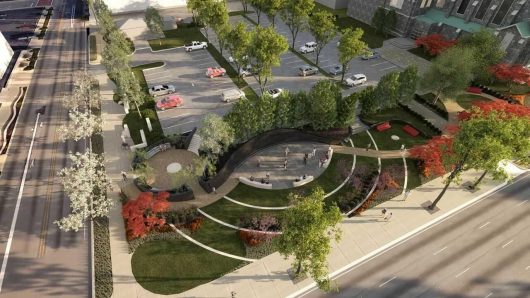
Illustration of the projected overhead view of the park. Credit: Courtesy of Gladden Social Justice Park
Columbus’ First Congregational Church United Church of Christ broke ground last week on what it is calling the nation’s first social justice park.
Set to open in August and located downtown at the corner of Cleveland Avenue and Broad Street, the Washington Gladden Social Justice Park will emphasize the continuum of social justice in our country’s future rather than one particular issue from history, said the Rev. Dr. Tim Ahrens, the church’s senior minister.
“There are places [in our nation] where justice has been done — civil rights, women’s rights — and if you go you’ll find a park or museum there, but it’s focused on one specific issue and point in time,” Ahrens said. “[Our park] is focused more generally and to the future on changing the world in a way that makes it fair and equitable for all people. It’s not celebrating one point or movement in history only; it’s celebrating the work throughout history that has changed the world.”
The park’s name is a reference to the Rev. Dr. Washington Gladden, who served as the church’s minister from 1882 until his death in 1918, Ahrens said.
“[Gladden] really is one of the unsung heroes and social reformers in the early part of the 20th century,” Ahrens said. “Columbus doesn’t often recognize him, though he was a national figure.”
The social justice aspect of the park will reflect Gladden’s life work as a nationwide advocate for civil rights, workers’ rights, voting rights, school integration and the needs of the poor and oppressed, Ahrens said.
“It’s a place where we will encourage and invest in people coming to have [civil] discourse,” Ahrens said. “It will be a place where we have programming, where we have music, where we have art that raises consciousness about the social challenges of our times, and the social injustices. So it’s a park with a purpose.”
To set it apart from traditional parks, the 18,000-square-foot L-shaped space will feature art created by women, people of color and other groups who have faced injustices. An area reserved for training youth in nonviolent civil disobedience, a main “Pathway of Justice” with quotes from historical social advocates like Martin Luther King Jr. and Rosa Parks, and many other installments that are still being planned, Ahrens said.
Additionally, the church plans to incorporate technology into the park to fit in with modern times.
“There will be apps created so that people can learn stuff historically but also get engaged in causes that are going on [because] the park is meant to be something that draws from the past but addresses the present and future,” Ahrens said.
Because of the park’s emphasis on being a safe space for everyone in the Columbus community, Tom Worley, chair of the Park Planning Committee, said the park will not have an agenda, but rather motivate people to take their own course of action.
“The focus is trying to bring people together so the park itself will not take a particular view on a social issue,” Worley said. “[The purpose is] to bring awareness [to social injustice] and allow the community to decide for itself what actions to take next and to help facilitate engagement so that people will know how to get involved on an issue that may concern them.”
As tensions surrounding issues such as racial profiling, gun reform, and women’s reproductive rights in our country have increased in recent months, the Washington Gladden Social Justice Park could not come at a more appropriate time, Ahrens said.
Ahrens and Worley believe that by building this park, they are creating a space that will be a center for change and social justice —even if that change starts from somewhere small.
“[The park] is meant to be something that raises consciousness,” Ahrens said. “This is a highly trafficked area — 40,000 people drive in front of this corner every day. With the park, every day they will have to look at the words social justice and they have to think, ‘what have I done for social justice today?’ By putting it in front of people, they have to deal with it.”

